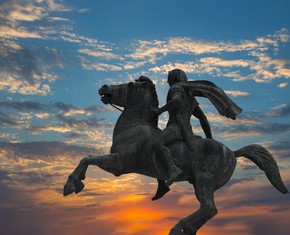The views expressed in our content reflect individual perspectives and do not represent the authoritative views of the Baha'i Faith.
You’ve heard all the tired teamwork clichés: “surrender the me for the we,” “there is no I in team,” “teamwork makes the dream work,” etc., etc.
Many businesses have posters on their walls featuring these platitudes, and it seems like every motivational speaker, book and video uses them, too—so if you kind of shrug and roll your eyes when you encounter these hackneyed phrases, it’s entirely understandable. All the old sports analogies do seem pretty trite after you’ve heard them a thousand times. I get it.
For some reason, though, these clichés continue to proliferate. More books and speeches and posters multiply. I have a theory about that: our cultures, with their emphasis on individualism, don’t naturally encourage unity. Instead, they tend to put the focus on one person, not a team of people. That’s why all those motivational aids have come into existence—they attempt to move people out of their me-focused silos and get them to cooperate.
We live in an age of rampant individualism. With the sole exception of sports, try to think of one major example where we honor groups rather than individuals—go on, I dare you.

We give most of society’s prizes to individuals. Genius grants go to individuals. In most nations we elect, or are forced to recognize, one individual as a leader. Awards for individual achievement proliferate, but very few awards for group achievement even exist. Have you ever been “Employee of the Month” in your workplace? If you think about it, that’s a pretty strange juxtaposition—when an organization puts up motivational posters about teamwork and then picks out one individual for recognition.
We recognize and honor celebrities as individuals, while we don’t always highlight or even appreciate the work of ensembles. We single out one heroic firefighter who saves the life of a child, but we rarely acknowledge that firefighting work wouldn’t be possible without an entire group of people dedicated to helping others. Even in sports, one star player can often overshadow an entire team.
In the reality-based human world, though, none of us ever accomplish anything without the help of others. The tale of the lone, heroic individual who does it all entirely on his own—that’s definitely a myth.
Don’t believe it? Just reflect on your childhood. The human species’ long period of gestation, infancy and childhood means that it takes a few decades to raise one child; and those many developmental years require an enormous amount of work, dedication and love from the parents and relatives and teachers of that child. Think about it for a moment: your parents made sacrifices for you and exerted enormous effort so you could grow up and thrive. They expended all that effort during the peak years of their adult lives. Your first teachers made their best efforts to give you the knowledge you need to learn and survive in the world. If you’ve given birth to or raised or taught a child, you already know what’s involved; and if you haven’t, just contemplate what your parents and your community did for you.
In the adult world, too, we’re all dependent on one another. No human being is independent of all others. Usually, we live in a house or an apartment or a tent someone else made. We eat food someone else grew and harvested. We drink water transported to us by the efforts of many other people. We drive on roads built by those we’ll never know or have the chance to thank. We ride in cars or on buses or in airplanes that entire teams of people designed and engineered and assembled. When we get sick, we go to doctors someone else took the time to train, and receive our care in hospitals other people built and funded and staffed. When we play an instrument, we make music thanks to a craftsman from long ago or far away. In virtually every avenue of life, we depend on others.
In this day, the Baha’i teachings say, there are no hermits:
Some of the creatures of existence can live solitary and alone. A tree, for instance, may live without the assistance and cooperation of other trees. Some animals are isolated and lead a separate existence away from their kind. But this is impossible for man. In his life and being cooperation and association are essential. Through association and meeting we find happiness and development, individual and collective.
For instance, when there is intercourse and cooperation between two villages, the advancement of each will be assured. Likewise, if intercommunication is established between two cities, both will benefit and progress. And if a reciprocal basis of agreement be reached between two countries, their individual and mutual interests will find great development. – Abdu’l-Baha, The Promulgation of Universal Peace, p. 33.
If I could wave a magic wand and make one change in the world, it would cause the increased recognition of this one basic truth: in man’s “life and being cooperation and association are essential.”
Recognizing that, we could stop believing and acting as though each one of us is an autonomous unit, a “lone ranger” who depends on no one else. We could comprehend and recognize the fact that we need each other. We’re social beings, we humans, and increased levels of association and cooperation between individuals and groups makes us stronger. That realization could lead to an increased consciousness of the essential reciprocity of cultures, peoples and nations. Knowing that we need unity, we would value it, seek it out and strive to make it happen.
In the next essay in this series, we’ll look at a striking example of this principle that played itself out on the world stage.
















Comments
Sign in or create an account
Continue with Googleor